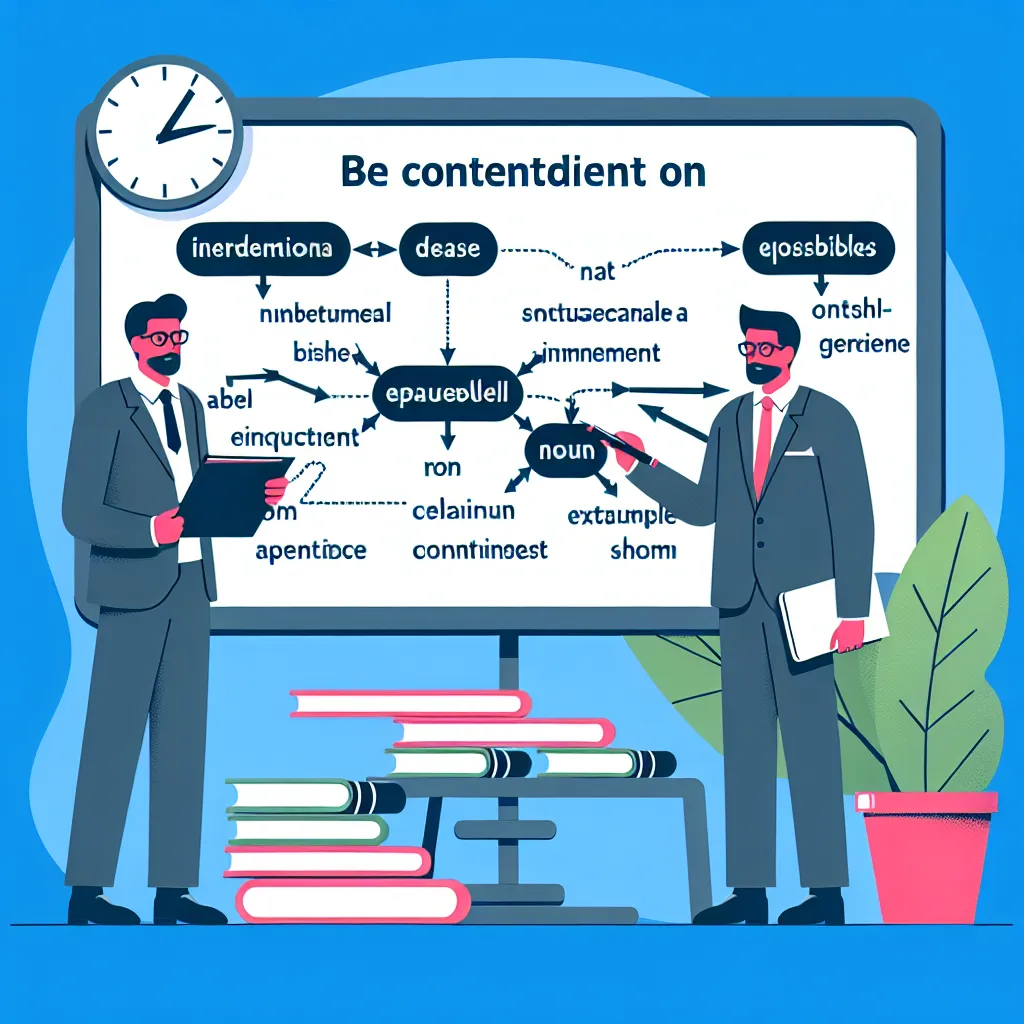Understanding and effectively using advanced grammatical structures like “be contingent on + noun” can significantly boost your IELTS score. This phrase is particularly useful in the Writing and Speaking sections, where demonstrating a wide range of vocabulary and complex sentence structures is crucial. Let’s dive deep into this structure and explore how you can leverage it to enhance your IELTS performance.
Understanding “Be Contingent on + Noun”
The phrase “be contingent on + noun” is used to express that something depends on or is determined by something else. It’s a more sophisticated way of saying “depend on” and can help you achieve a higher band score in IELTS by showcasing advanced vocabulary and grammatical structures.
Formula and Grammatical Structure
The basic structure is as follows:
[Subject] + [be verb] + contingent on + [noun/noun phrase]
It’s important to note that the verb “be” should agree with the subject in number and tense. For example:
- Singular present: The success of the project is contingent on funding.
- Plural present: The results are contingent on multiple factors.
- Singular past: The decision was contingent on the committee’s approval.
- Plural past: The negotiations were contingent on both parties agreeing to the terms.

Using “Be Contingent on + Noun” in IELTS Writing
Incorporating this structure in your IELTS Writing tasks can help you achieve a higher score by demonstrating your ability to use complex grammar accurately. Here are some examples of how you can use it in different types of IELTS essays:
Task 1 (Academic) – Graph Description
When describing trends or relationships in graphs, you can use this structure to explain dependencies:
“The growth rate of the company is contingent on market conditions, as shown by the fluctuations in the graph.”
Task 2 – Opinion Essay
In an opinion essay, you can use this structure to express your views on dependencies:
“I believe that successful urban development is contingent on effective public transportation systems. Without reliable and accessible transport options, cities may struggle to manage population growth and maintain a high quality of life for residents.”
Task 2 – Problem-Solution Essay
When discussing solutions to problems, this structure can be useful:
“The implementation of environmental policies is often contingent on public support. Therefore, raising awareness about ecological issues is crucial for the success of any green initiative.”
Applying “Be Contingent on + Noun” in IELTS Speaking
Using this structure in your IELTS Speaking test can impress the examiner and potentially boost your score. Here are some examples:
Part 1 – Personal Questions
Examiner: “Do you think success in your studies is important?”
You: “Absolutely. I believe that success in my future career is contingent on my academic performance now. It’s crucial to build a strong foundation of knowledge and skills.”
Part 2 – Cue Card
Topic: Describe a decision you made that changed your life.
“I’d like to talk about my decision to study abroad. It was a choice that was contingent on several factors, including my academic performance, financial situation, and family support. This decision has had a profound impact on my personal growth and career prospects.”
Part 3 – Discussion
Examiner: “How do you think technology affects education?”
You: “I think the effectiveness of technology in education is contingent on how it’s implemented. While digital tools can enhance learning experiences, their success is contingent on proper training for teachers and adequate infrastructure in schools.”
Common Mistakes and How to Avoid Them
When using “be contingent on + noun,” learners often make the following mistakes:
-
Incorrect preposition: Using “of” or “to” instead of “on.”
Incorrect: The success is contingent of funding.
Correct: The success is contingent on funding. -
Forgetting to use a noun or noun phrase after “on.”
Incorrect: The results are contingent on how well.
Correct: The results are contingent on how well the team performs. -
Using the wrong form of “be” verb.
Incorrect: The outcome be contingent on the weather.
Correct: The outcome is contingent on the weather.
To avoid these errors, practice using the structure in various contexts and always double-check your sentences to ensure you’ve followed the correct formula.
Alternative Expressions for Variety
While mastering “be contingent on + noun” is valuable, it’s also important to show range in your language use. Here are some alternative expressions that convey a similar meaning:
- Be dependent on
- Rely on
- Hinge on
- Be subject to
- Be determined by
For example:
“The success of the project is contingent on funding.”
“The success of the project hinges on funding.”
“The success of the project is dependent on funding.”
Using these variations can help you avoid repetition and demonstrate a broader vocabulary range, potentially leading to a higher band score in both Writing and Speaking tasks.
Conclusion
Mastering the “be contingent on + noun” structure can significantly enhance your IELTS performance. By incorporating this phrase into your Writing and Speaking responses, you demonstrate advanced language skills and the ability to express complex ideas clearly. Remember to practice using this structure in various contexts and combine it with other sophisticated vocabulary and grammar to achieve the best possible score in your IELTS exam.
To further improve your skills, try creating sentences using this structure for different IELTS topics such as environment, education, technology, and social issues. The more you practice, the more natural and confident you’ll become in using this advanced grammatical structure during your IELTS test.